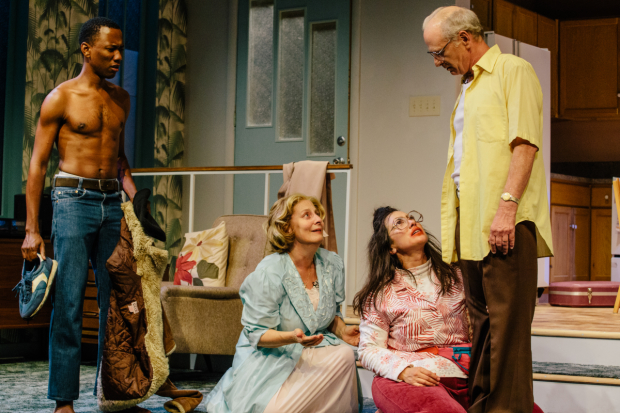The Model Apartment

(© Jeff Lorch Photography.)
Anchored by actress Marilyn Fox's exquisite portrayal of a retiree trying to keep her family together, The Model Apartment is a stirring evening. The talented four-person ensemble draws the audience into this tragic and relatable drama at Geffen Playhouse.
Max (Michael Mantell) and Lola (Fox) have retired to Florida. They arrive after a long trip from Brooklyn to discover their new condo will not be ready for several days, and they must camp out in the model unit. Though charmingly decorated, the shell of a place contains no bedroom, a fake television, and no working appliances. They make do and settle in for a romantic evening only to be interrupted by their daughter Debbie (Annika Marks), an exhausting adult-child who demands constant supervision and attention. Debby has brought along her very young, and equally dependent boyfriend (Giovanni Adams), whom she recently rescued from the streets. Having fled New York in order to escape their problem child, Max and Lola now unleash all of their bottled up rage that had been bubbling since their captivity in Hitler's concentration camps.
Margulies' dialogue captures the flavor of the "greeners" (Yiddish-speaking immigrants from the war), including their inflections and word choices. Anyone who grew up with Holocaust-surviving family members or neighbors will instantly recognize Lola and Max, the protagonists of The Model Apartment. The unspeakable day-to-day horrors of the concentration camps haunt their lives over 40 years later, affecting their decisions and their interactions. Lola and Max's relationship is almost bipolar, endearing one moment and blisteringly abusive the next.
Lola is the constant pleaser. She needs people to be happy and calm. Max concerns himself only with himself, his needs, and his wants. Anything in his way is an aggravation. Both temper their responsibilities to Debby based on their past. Lola has never forgiven herself for denying her mother's pleas at the camps that led to her mother's death and her own survival. As a result, she therefore refuses to reject her own child. Max fled from his childhood family to the woods and (literally and metaphorically) uses that option too often now when relating to his daughter.
Debby, who was named after her dead half-sister, carries the pain of her namesake. Though Debby was born after the war, the ghost of Max's precious Deborah, about whom Max still dreams, paralyzes her. Debby also suffers from a mental condition. It's unclear whether schizophrenia or autism, but her condition irritates her father and puts an extra burden on her mother.
Fox is luminous as Lola. Loving, but exasperating, she insinuates herself into everyone's lives, including Debby's homeless boyfriend. Lola's love for Max is obvious in how she placates him, but Fox also depicts the exhaustion of a woman pulled apart by her family members. Marks creates diverse characters doubling in the roles of both Debby and the visions of Deborah. Saddled with a fat suit for Debby, she protrudes the manic personality of a girl whose mind goes too fast. When playing Deborah in Max's dreams, she projects a gentleness missing in Debby.
The hulking Adams portrays a fragile man who is slow and childlike, yet hypersexual. It is surprising this simple man who seems to have the maturity of a 10-year-old was able to drive from Brooklyn to Florida straight and find a condo with just an address and no Google Maps to guide him. Mantell has the toughest role as the cold Max. When he dances with Fox, he shows a sensuality rarely reflected in theater about senior citizens. His Yiddish monologues also sound authentic.
Though director Marya Mazor has assembled a talented cast, some of her choices disrupt the play's flow. The constant blackouts (some run for almost a minute) disjoint the show, making it seem too episodic and distancing the audience from the characters.
The costumes by Sara Ryung Clement fit the late '80s setting and the personalities of the characters. Debby's fat suit does not look exaggerated. Until Marks returns with her hair combed and her fat suit off, it is not obvious that it is even a costume.
In Margulies' play, the past and the present collide and there seems to be no easy answers when pertaining to family ties. After decades of bottled up emotions, these character deserve more than 90 minutes of us bearing witness to the ways in with each of them survived.











